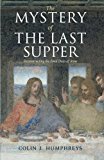 In Holy Week there was an article in our newspaper lifted from The Times without critique or adaptation. Christians, we were told, are celebrating the Last Supper a day late. “Millions of Christians in the Western world will commemorate the Last Supper of Christ with His disciples on Maundy Thursday as Holy Week leads into Easter. But they will be a day late…” We got it wrong yet again! [The Times website charges for this sort of stuff – but put the quote into a google search and you can read it for free at fairfaxmedia.newspaperdirect.com/epaper/viewer.aspx]
In Holy Week there was an article in our newspaper lifted from The Times without critique or adaptation. Christians, we were told, are celebrating the Last Supper a day late. “Millions of Christians in the Western world will commemorate the Last Supper of Christ with His disciples on Maundy Thursday as Holy Week leads into Easter. But they will be a day late…” We got it wrong yet again! [The Times website charges for this sort of stuff – but put the quote into a google search and you can read it for free at fairfaxmedia.newspaperdirect.com/epaper/viewer.aspx]
One sentence in the article I could make no sense of whatsoever: “Humphreys said: ‘‘The basic contradiction which has puzzled scholars is that Matthew, Mark and Luke say the Last Supper was a Passover meal but John says it was before the Passover. The Passover on Friday was such a distinctive meal, more so than Christmas, that it is strange to make this mistake.”
First important point, especially on a liturgy site: we are not primarily replicating the historical events of Jesus’ life in our liturgical celebrations. Yes, there is an element of remembering. Yes, there is an element of drama. But, however present in folk re-enactments, there’s no donkey in the formal liturgical rites on Palm Sunday. We read the Passion story through to Christ’s death on Palm Sunday without pretending he died on that day. Christ’s risen presence is with us on Good Friday. And so on…
Secondly, people are easily confused by the way that Jews think about “days”. The Jewish day starts at sundown – so from that perspective the Last Supper and Christ’s death happened on the same day.
Thirdly, another important point is that IMO the search for absolutely consistency between the gospels is a mistaken understanding of the genre. Attempting to harmonise everything is a mistake.
That said, anyone who spends any time with the gospels will have noticed that the Synoptics (Matthew, Mark, Luke) have a different relationship between the Passover and the Last Supper and Christ’s death than John’s Gospel does. The Synoptics have the Last Supper as the Passover Meal. John’s Gospel would have the Last Supper the day before the Passover (see here).
The article focuses onColin Humphreys, who “studies the Bible when not pursuing his day-job as a materials scientist”. He has come up with a solution and written it up in a new book, The Mystery of the Last Supper: Reconstructing the Final Days of Jesus. [He is also the author of The Miracles of Exodus: a Scientist Reveals the Extraordinary Natural Causes Underlying the Biblical Miracles (Harper Collins, 2003).]
Humphreys has an “older calendar” and a “newer calendar” at the time of Jesus. He puts the Last Supper on Wednesday, following the older calendar/Synoptics passover. Then he has all Thursday for the trial before the Sanhedrin, Friday for the trial before Pilate and Jesus’ execution, and Saturday as the newer calendar/John passover.
No gospel, of course, gives any hint internally that there are different calendars. Mark has Peter’s denial “this day, this very night” and no hint of an extra day. So if you are hassled by inconsistencies, as Humphreys appears to be, you are just moving them around, not solving them.



